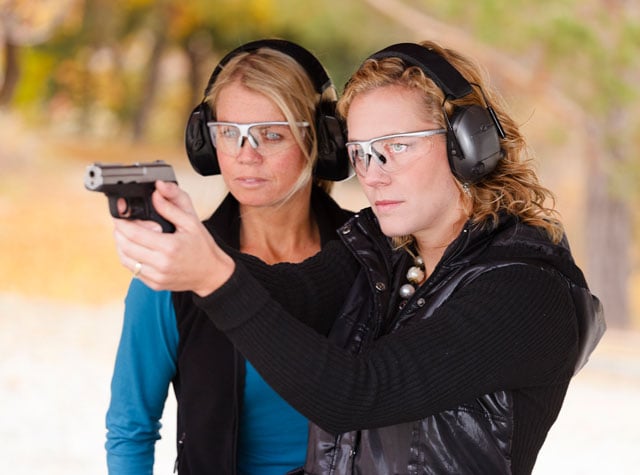Deciding to undertake firearms training is an important step for many people, whether for licensing, work, or recreational shooting. For those who are pregnant or planning pregnancy, there are some additional factors to consider before stepping onto the range.
At Asset College, our priority is student safety and wellbeing. This article is designed to provide balanced information about the potential risks of participating in firearms training during pregnancy. While the risks are generally minimal, understanding them will help you make an informed decision about whether now is the right time to train. Ultimately, the choice rests with you, in consultation with your healthcare provider.
Understanding the Risks of Firearms Training During Pregnancy
While firearms training is generally low intensity, there are some exposures and activities that may be important to consider during pregnancy.
| Risk Area | What It Involves | Why It Matters During Pregnancy |
|---|---|---|
| Lead Exposure | Small amounts of lead are released when firearms are fired, particularly from ammunition. Ranges follow strict safety practices to minimise exposure. | Lead is known to pose health risks during pregnancy. Even low-level exposure can be a concern for both parent and baby, making this an important factor to consider.. |
| Noise Levels | Firearms produce extremely high-decibel sound, often above safe thresholds. Hearing protection is mandatory and reduces risk significantly. | Loud sounds may still travel through the body, and unborn babies can be more sensitive to noise. Research suggests excessive noise during pregnancy could potentially affect hearing development. |
| Physical Exertion | Training usually involves standing, light walking, and holding firearms. Physical demands are minimal compared to many other activities. | Pregnancy can make even low-intensity activities feel more tiring. Balance, posture, and fatigue should be considered, particularly in later stages. |
| Recoil & Pressure | Each shot produces recoil and a pressure wave (the shockwave from firing). For most students, this is minor and easily managed with correct technique. | During pregnancy, recoil and pressure may feel more pronounced and could cause discomfort. While there is no strong evidence of harm, some may prefer to avoid this exposure. |
When to Reconsider Participation
The stage of pregnancy is an important factor when deciding whether to participate in firearms training.
- Third Trimester: Participation in live fire training is not recommended during the third trimester. At this stage, physical comfort and balance can be more difficult to maintain, and sensitivity to noise and other stressors is increased. Deferring training until after pregnancy is generally the safer option.
- Earlier Stages of Pregnancy: Some people may choose to participate in the first or second trimester. If you are considering this, it is important to consult with your healthcare provider first. They can provide advice specific to your health, pregnancy stage, and any individual risk factors.
Ultimately, the decision should be made in consultation with your doctor and only if you feel confident in doing so.
Alternative Options
If live fire training isn’t the right choice during pregnancy, there are still flexible options available.
- Complete theory components: Firearms courses include essential classroom-based learning about safety, handling, and responsibilities. These components can sometimes be completed separately, with the live fire component deferred until after pregnancy. Please note that the course cannot be completed on theory alone — live fire training is a mandatory requirement.
- Defer your course: If you’ve already enrolled and prefer not to continue at this time, our team can help you reschedule the entire course until after your pregnancy. This ensures you don’t miss out on training but can return when it’s more suitable.
We encourage students to contact us before enrolment or as soon as possible if they would like to discuss these options.
Making the Best Choice for You
Firearms training is an important commitment, and pregnancy adds extra considerations that deserve careful thought. The potential risks from lead exposure, noise, physical exertion, and recoil are generally minimal but are still present. For this reason, the safest approach is to discuss your plans with your healthcare provider before enrolling or attending training.
If your doctor advises against participation at this time, remember that your training can be deferred. There will always be opportunities to complete your course once it is the right time for you. Your safety and wellbeing come first, and Asset College is here to support you in finding the pathway that suits your circumstances.
Pregnancy does not mean giving up on your interest in firearms training, but it does mean making informed choices. The key considerations are:
- Avoid participation in the third trimester.
- Seek medical advice before participating at any other stage.
- Consider deferring your course or completing theory components with live fire postponed.
By weighing up these factors with professional medical guidance, you can make the decision that best supports your health and training goals.
Ready to take the next step when the time is right?
Disclaimer
This article is intended as general guidance only. It does not replace medical advice. Asset College recommends that anyone who is pregnant or planning pregnancy consult with their healthcare provider before undertaking firearms training.




